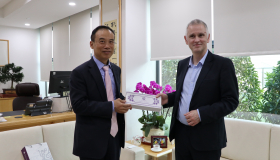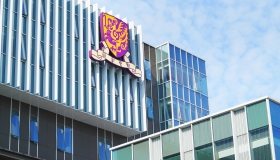The 4th Master Forum: Prof. Lawrence J. Lau on What Makes China
“Regardless of what happens in the rest of the World,China should be able to continue growing at an average annual rate of around 7%.” On Jan 22, 2015, at the 4thMaster Forum on campus at the Chinese University of Hong Kong, Shenzhen, Prof. Lawrence J. Lau, Ralph and Claire Landau Professor of Economics at CUHK and the University’s former President, delivered a lecture on China’s economy, forecasting the future development of China.
China has become the fastest growing economy in the world—averaging 9.8% per annum since it began its economic reform and opened to the world in 1978, 36 years ago. It is historically unprecedented for an economy to grow at such a high rate over such a long period of time. Why has China been able to grow at such a high rate over such a long period of time?
A natural first explanation is China’s highly favourable economic fundamentals and its unlimited supply of surplus labour. However, as Prof. Lau pointed out, while favourable economic fundamentals are necessary, they are by no means sufficient. For example, why did China succeed in introducing free market while the former Soviet Union failed? It turns out that the choice of strategy for the economic transition matters, said Prof. Lau, “Instead of dismantling the mandatory central plan all at once, the Chinese Government adopted the ‘Dual-Track’ approach, introducing enterprise autonomy and free markets on the margin while continuing to enforce the existing central plan.” In practice, for example, the strategic methods for economic reform can be found in the “Processing and Assembly” operations, and the flexible “New People, New Way; Old People, Old Way.”
Speaking of the successful past, will China continue to grow at a high rate in the future? Prof. Lau’s answer is still yes.
“The Chinese national saving rate will remain high and labour surplus will continue to exist for a couple of decades, as will the advantages of a huge domestic market,” he added, as the Chinese capital-to-labour ratio is still relatively low for the country as a whole, “there is therefore still a great deal of room for tangible input-driven economic growth and eventually for intangible-capital driven growth as investments in human capital and R&D capital continue to increase.”
During the Q&A session, Prof. Lau shared his views with students on various issues such as the impact of the oil price drop on China’s economy, the development trend of the Philippines economy and the issue of “middle income trap”, etc.

About the Speaker:
Professor Lau received his B.S. degree (with Great Distinction) in Physics from Stanford University in 1964 and his M.A. and Ph.D. degrees in Economics from the University of California at Berkeley in 1966 and 1969 respectively. Professor Lau joined the faculty of the Department of Economics at Stanford University in 1966, became Professor of Economics in 1976 and Kwoh-Ting Li Professor in Economic Development in 1992.From 2004 to 2010, Professor Lau served as Vice-Chancellor (President) of the Chinese University of Hong Kong. From September 2010 to September 2014, he served as Chairman of CIC International (Hong Kong) Co., Limited. Since 2007, Prof. Lau has also been serving concurrently as Ralph and Claire Landau Professor of Economics at The Chinese University of Hong Kong.
Professor Lau has been elected a Fellow of the Econometric Society, an Academician of Academia Sinica, an Honorary Member of the Chinese Academy of Social Sciences and an Academician of the International Eurasian Academy of Sciences. Professor Lau is a member of the 12th National Committee of the Chinese People's Political Consultative Conference and a Vice-Chairman of its Economics Subcommittee, a Vice-Chairman of the China Centre for International Economic Exchanges, a Vice-Chairman of the China Science Center of the International Eurasian Academy of Sciences, an Adviser to the National Bureau of Statistics of the People's Republic of China, a member of the International Advisory Council of the China Development Bank, the Vice-Chairman of the Advisory Committee of the Qianhai Shenzhen-Hong Kong Modern Service Industry Cooperation Zone of Shenzhen, a Director of the Chinese Association of Hong Kong and Macau Studies, a Member of the Exchange Fund Advisory Committee of the Hong Kong Monetary Authority and Chairman of its Governance Sub-Committee, and a member of the Board of Directors of the Chiang Ching-Kuo Foundation for International Scholarly Exchange, Taipei.




